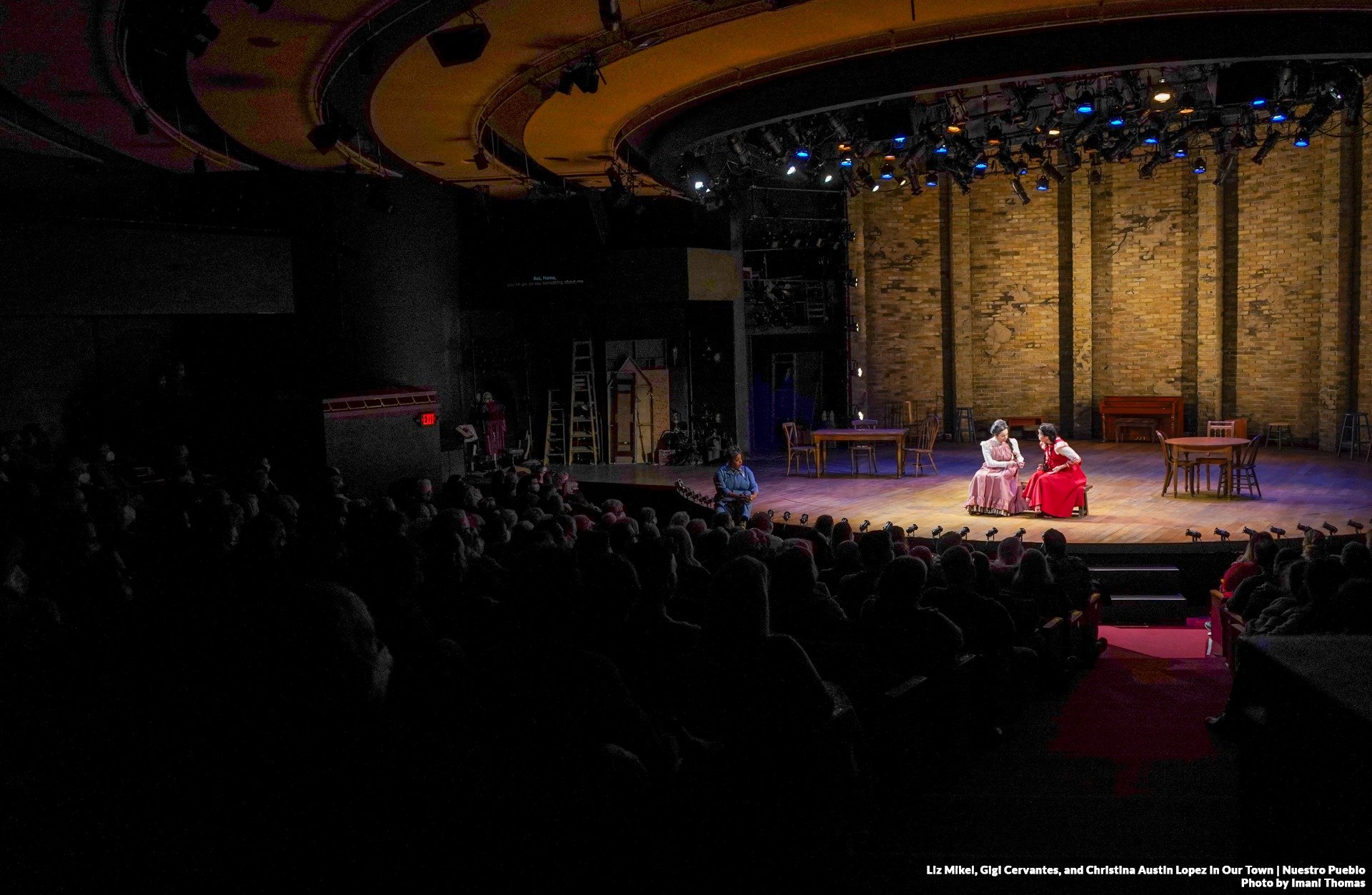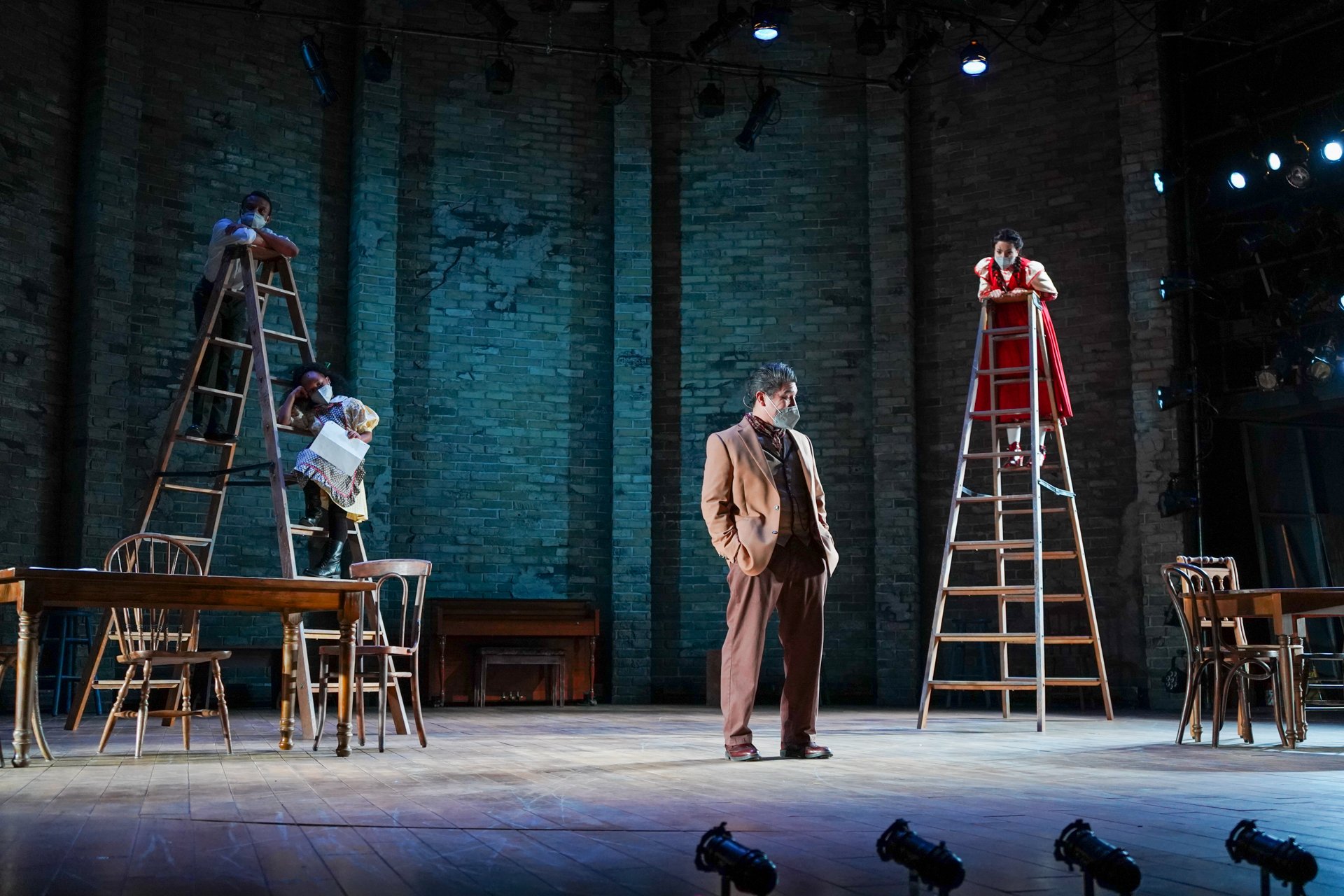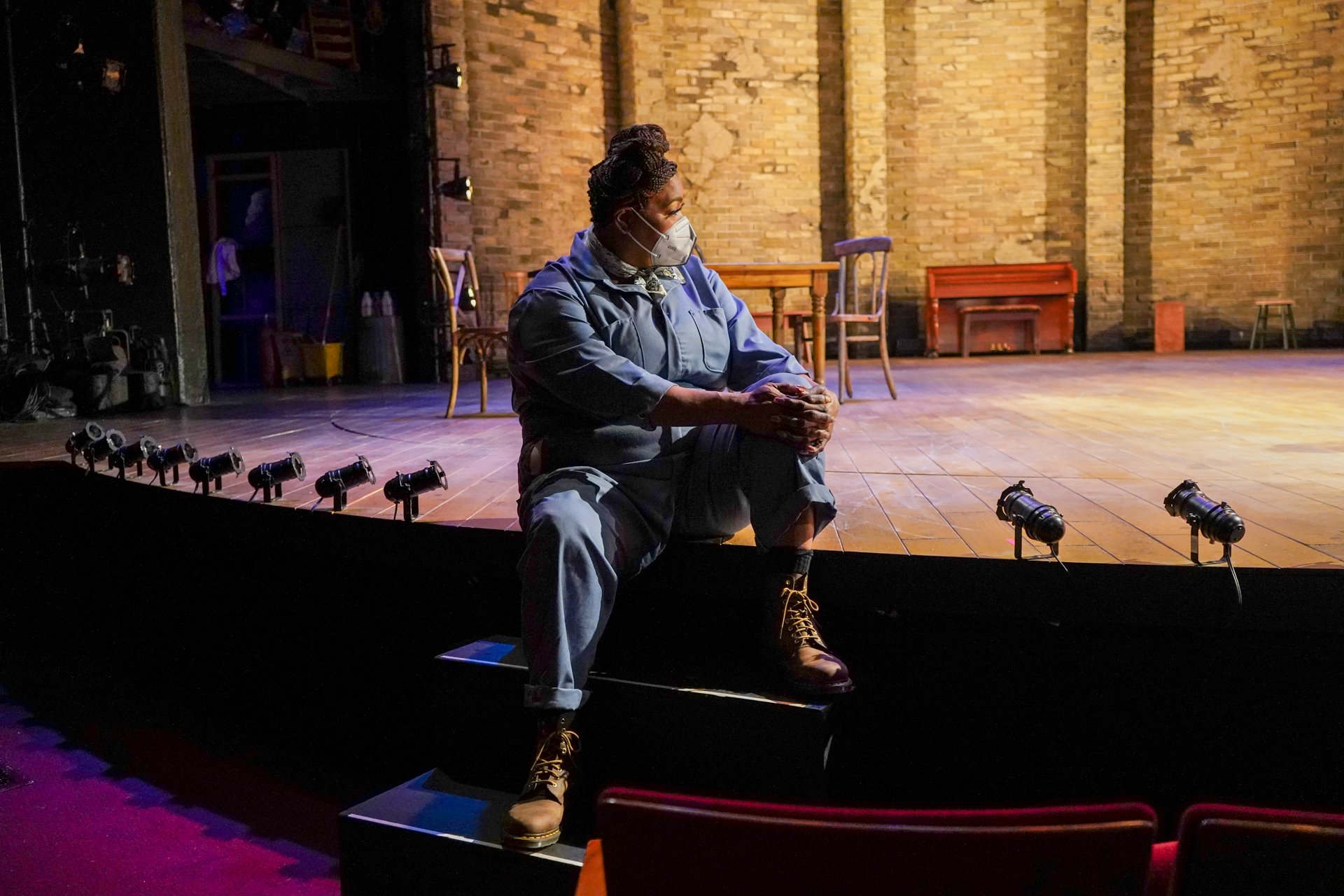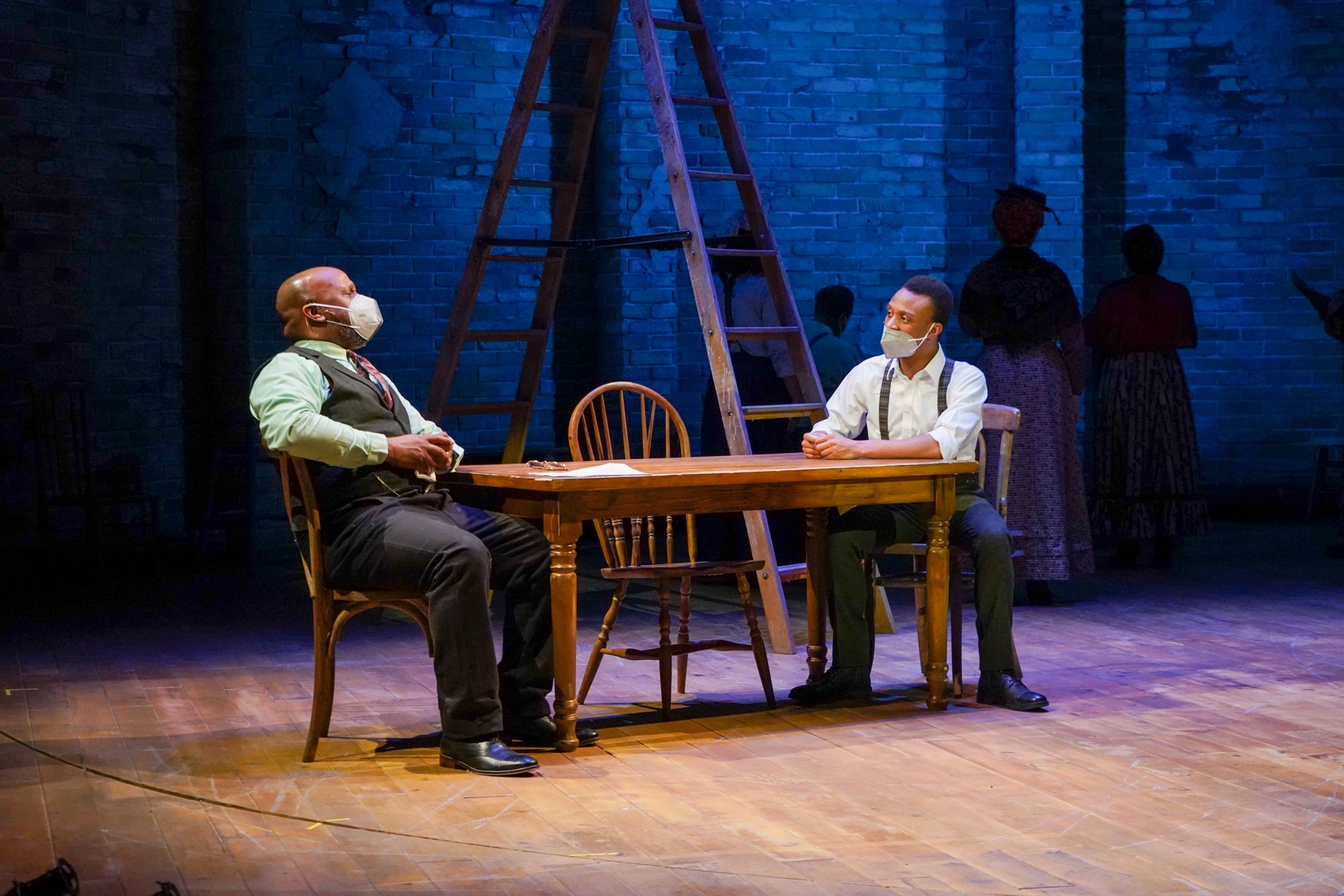Our Town/Nuestro Pueblo @ Dallas Theater Center
—Jan Farrington
When was the last time you saw an Our Town with a strolling guitarist or a trumpet? A wedding where George and Emily jump the broom? A milkman who says “Good morning” to one woman at her back door—and “Buenos dias” to the next? An intermission where a culture-crossing party breaks out (actors become singers and musicians—and oh, my, such good ones!), and just keeps going?
This is Dallas Theater Center’s Our Town/Nuestro Pueblo, directed with warmth and honesty (and an eagle eye for detailed and enriching theatrical possibilities) by Tatiani Pandiani—and starring a cast who look just like the “our towns” we live in here in North Texas. This multilingual version, with passages of Thornton Wilder’s classic text translated into Spanish for the first time, doesn’t make a fuss about the multi-ethnic choice. It simply is…and it works.
And yes, the actors onstage wear masks—as do we in the audience. It’s something we get used to after a few minutes, and in a way, puts yet another emphasis on community: We are all in this together. In her director’s note, Pandiani says like all great plays, this Our Town “seems to be written for right now,” a moment when we’ve all faced the eternal truth that “one day we are here, and then suddenly we are not.”
The new version (originally adapted for English, Spanish and Creole; DTC uses English and Spanish) premiered in 2017 at Miami New Drama, with translated passages by Cuban-American playwright Nilo Cruz and Haitian-American playwright Jeff Augustin. Director Pandiani has been involved with this extraordinary re-envisioning of the play (among other pursuits, she’s in charge of “new works” at Miami New Drama) for a while now. Her depth of experience shows in a matter-of-fact, light-handed treatment that (by not hitting us over the head) digs all the deeper into our emotions.
By the last lines, I felt as though I’d lived a lifetime myself in the tiny New Hampshire town of Grover’s Corners, experiencing the events of life we like to call “big” and “small”—birth, breakfast, school days, choir practice, new love, strawberry sodas, weddings, lost love, grief.
DTC favorite Liz Mikel (soon leaving for New York to play John Hancock in a revival of 1776) is a clear-eyed, larger-than-life presence as the Stage Manager. From the moment the play begins, with the lights up in the theater, we are in and of this story, and Mikel makes sure we know it. She has things to say to us, and to the actors; it’s all one, indivisible by any theatrical “fourth wall.” We have the feeling the actors hear what the Stage Manager says to us—and we certainly “overhear” what’s said between Mikel and the characters, who step out of “acting” to consider things for a moment.
“It goes so fast. We don’t have time to look at one another,” young Emily tells the Stage Manager. “Do any human beings ever realize life while they live it?—every, every minute?”
“No,” the Manager says to her. “The saints and poets, maybe—they do some.”
Christina Austin Lopez and Zachary J. Willis make an engaging Emily and George, the young lovers of the play who are literally the girl and boy next door. Just kids at first, awkwardly charming, we soon find a grave, growing-up sweetness in them (they’re so watchful and concerned about each other) that lifts them up—and makes us root for their romance to go on forever.
Most folks, wrote Wilder, tumble into the grave “two by two,” and he gives ample stage time to the married folk. George and Emily’s parents, the “Gibbses” and Webbs, have an almost musical rhythm as they move around in their kitchens and yards. In these everyday encounters, they sound every note for us of the love, frustration, joy, tenderness, worry, and yes, comedy of a lifelong partnership. Kenneisha Thompson and Jamal Sterling play Mrs. and Doc Gibbs, the town physician. She’s a worrier, he’s a gentle joker—and both care deeply for each other and their two children, George and Rebecca (a lively Madison Bryant).
Emily’s parents are enormously proud of their smart daughter. Newspaper editor Mr. Webb (a terrific David Lugo) is dry-humored and affectionate, and Mrs. Webb (Gigi Cervantes) a bustling, loving woman who once “saw the Atlantic Ocean.” She’s no fool, though—her tearful protest over keeping girls “blind as a bat” about marriage and life is memorable. The Webbs call their daughter “Emilia” and speak Spanish within the family. The diversity of the town is a given, not a discussion.
Small-town life isn’t a picture-perfect dream, of course. (Remember, this is a play that ends up at the graveyard.) There are those, like sadly bitter choir director Simon (Alex Organ), whose “troubles” overwhelm their spirits. There are chatty, silly characters who don’t seem to learn a thing from life (Molly Searcy’s Mrs. Soames makes us sigh)—though they’re not bad people. And there are the folk who just keep on, steady as rocks, helping hold the town together. (I’m thinking of Ivan Jasso as milkman Howie Newsome, Bob Hess as Joe Stoddard at the cemetery, Bryan Pitts as Constable Warren.)
English-language subtitles on either side of the stage translate the Spanish. At certain performances audiences can hear a complete real-time (“simultaneous”) Spanish translation on headphones, presented by a crew of voice actors directed by Alexandra Hernandez and Ana Armenta. The space given to both languages makes explicit what was always in Wilder’s play: the idea that we are a global town, one humanity, sharing our lives—our one, unrepeatable time on this earth.
A round of applause for Christopher and Justin Swader’s minimalist but rich stage design: a tall, curving brick wall (with skyscape above) provides a stage of its own for Yuki Nakase Link’s evocative lighting. The rich colors of Yvonne Miranda’s costumes fill our eyes (I lusted after the floral pinafore on George’s little sister Rebecca), and Emily’s Mexican-inspired wedding clothes are a particular delight. The four musicians (also part of the cast) must be given special mention too: Cesar Anguiano on vocals and guitar; Diego Reyna on trumpet; Kami Lujan on percussion; and Sam Henderson on piano. (Kudos to music director Jesse Fry.)
I’ll be blunt: This is must-see theater. Catch it if you can.
WHEN: Through February 20
WHERE: Kalita Humphreys Theatre



